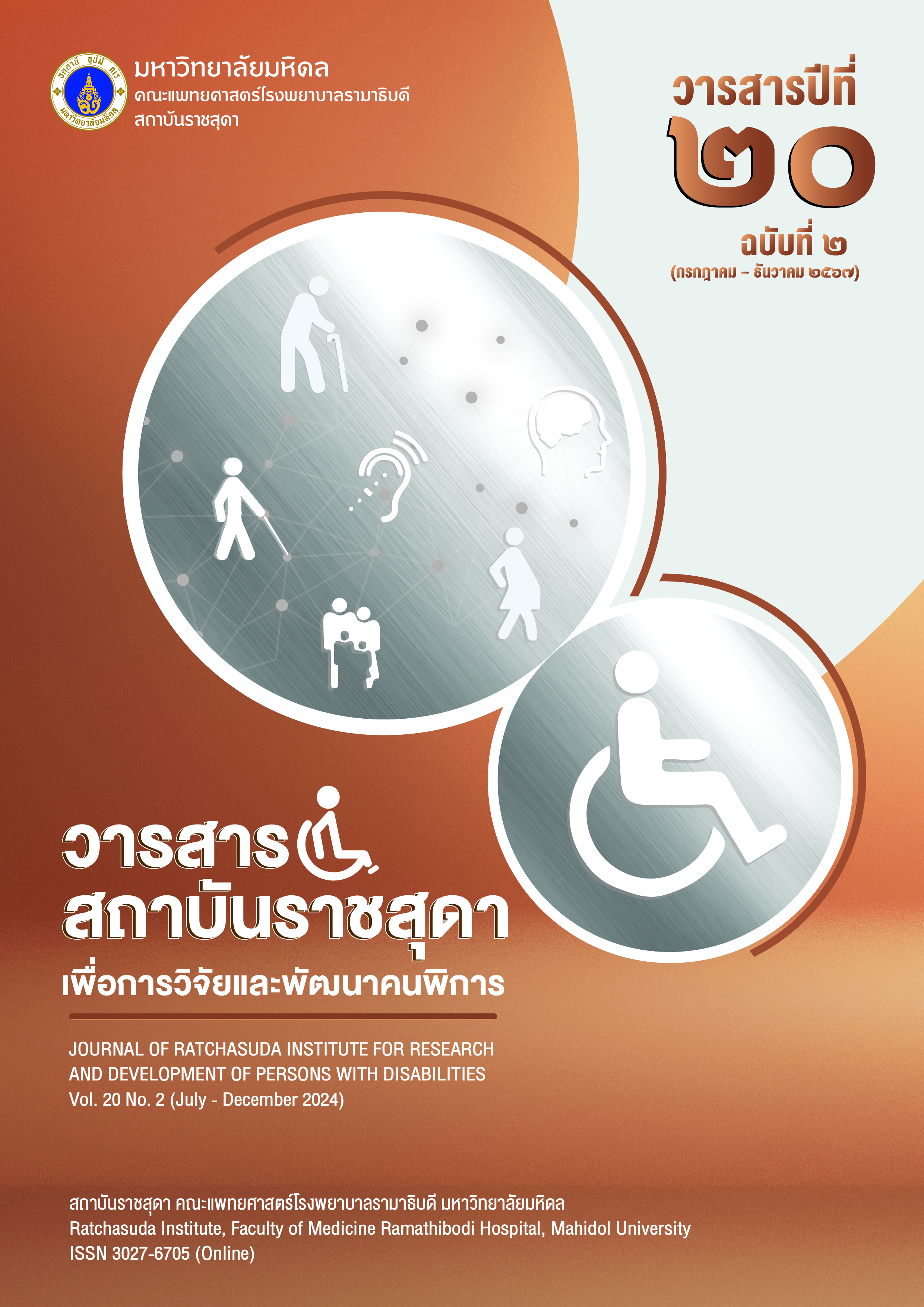The Effect of an Online Individual Counseling Program on the Adaptation of Stroke Caregivers
Keywords:
Caregivers of Stroke Patients, Adaptation, Online Individual CounselingAbstract
Caregivers of stroke patients often encounter mental and physical issues, especially the caregivers who have never had experiences in taking care of them before. As a result, problems with incorrect adaptation could lead to patients receiving inappropriate care as well as themselves. Thus, this study used counseling to promote the ability to develop adaptive behavior of caregivers. It aimed at studying the effects of an online individual counseling program on the levels of caregiver’s adaptation. The objectives were 1) to compare the effects of the program on the levels of caregiver’s adaptation at pre-experimental and post-experimental periods 2) to compare the effects of the program at the post- experimental period between the experimental group and the control group. The samples in this study were 10 caregivers of stroke patients who received services in Occupational Therapy Department at Sirindhorn National Medical Rehabilitation Institute. They were divided into 2 groups: a control group and an experimental group with the use of purposive method and quasi-experimental research design. A two-group experiment was conducted to measure results before and after receiving the counseling program. The research instruments consisted of 1) the counseling program take place eight weeks (1 days in each week/60 minutes per session). 2) an adaptive behavior scale for caregivers. Data were analyzed using descriptive and reference statistics. The result showed that the mean of the level of caregiver’s adaptation in the experimental group after receiving the counseling program had increased from 2.18 to 3.85 at statistically significant level of .05 (Wilcoxon Signed Ranks Test: p-value 0.043). The mean of caregiver’s adaptation of the control group (before and after) in the experiment period had increased 0.12 and experimental group increased 1.67. There was a significant between-group difference in the level of adaptative behavior in the experimental group over the control group at statistically significant level of .05 (Mann-Whitney Test: p-value 0.009). Therefore, this study indicated that an online individual counseling program could promote and develop adaptation of stroke caregivers.
Downloads
References
Chaiyasaj, N. (2018). The Effect Preparation of Caregiver’s to adaptation in Caring for End – of – Life Patients in Community. Mahasarakham Hospital Journal, 15(3), 45-54.
Chuburi, O. (1996). Caregivers’ s Role in Taking Care of Patients with Cerebrovascular Disease as Expected by caregivers and Nurses [master’s thesis, Prince of Songkla University]. PSU Knowledge Bank. https://kb.psu.ac.th/psukb/bitstream/2016/13322/1/98051.pdf
Ckumdee, S., Arpanantikul, M., & Sirapongam, Y. (2014). Family Caregivers’ Adjustment Problems in Caring for Stroke Patients. Thai Journal of Nursing Council, 29(4), 45-63.
Division of non-communicable disease, (2022, October 28). Campaign for World Stroke Day or World Paralysis Day 2022. https://pr.moph.go.th/?url=pr/detail/all/02/180623
Dongmanee, J. (2013). Theories of counseling and psychotherapy (2nd ed). Technology Promotion Association (Thailand-Japan).
Paksee, N., Srivisai, T., & Khunkaew, S. (2021). Preparation of Family Caregivers of Patient with Stroke on Transitional Care from Hospital to Home. Boromarajonani College of Nursing, Uttaradit Journal, 1(13), 47-61.
Rattamuksik, S., Neelapaijit, A., & Rachatawan, W. (2019). Effect of Individual Counseling Program on Resilience of Prepare before Getting Back to Work with Physical Disabilities. Journal of Education, 29(3), 218-229.
Rice, J. D., Sperling, S. A., Brown, D. S., Mittleman, M. S., & Manning, C. A. (2022). Evaluating the efficacy of TeleFAMILIES: a telehealth intervention for caregivers of community-dwelling people with dementia. Aging & Mental Health, 26(8), 1613-1619.
Rogers, C. R. (1952). " Client-Centered" Psychotherapy. Scientific American, 187(5), 66-75.
Rogers-Warren, A., & Warren, S. F. (1980). Mands for Verbalization: Facilitating the Display of Newly Trained Language in Children. Behavior Modification, 4(3), 361-382. https://doi.org/10.1177/014544558043006
Roy, C. (1974). The Roy adaptation model. Conceptual models for nursing practice.
Saitree, R., Chaimay, B., & Woradet, S. (2019). Activities of Daily Living among Stroke Patients. Academic Journal of Community Public Health, 5(2), 1-13.
Wangmanee, K., & Songsaen, S. (2021). The Individual Online Counselling Program for Social Adjustment under The COVID 19 Situation of Chiang Rai Rajabhat University Students. Journal of Education Burapha University, 32(2), 29-42.

Downloads
Published
How to Cite
Issue
Section
License
Copyright (c) 2024 Journal Of Ratchasuda Institute for Research and Development of Persons With Disabilities

This work is licensed under a Creative Commons Attribution-NonCommercial-NoDerivatives 4.0 International License.
บทความที่ได้รับการตีพิมพ์เป็นลิขสิทธิ์ของวารสารสถาบันราชสุดาเพื่อการวิจัยและพัฒนาคนพิการ





